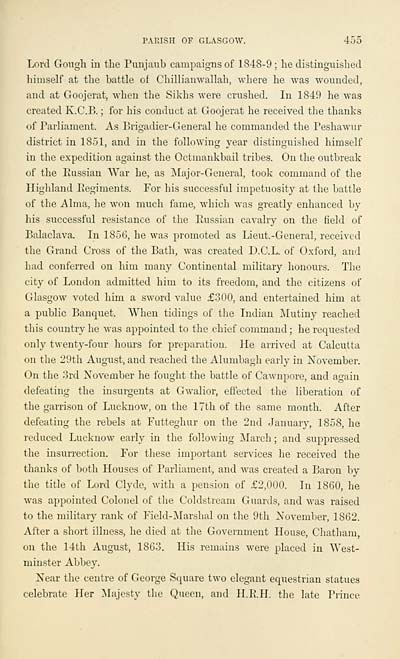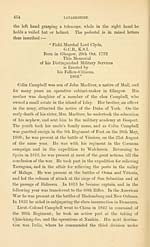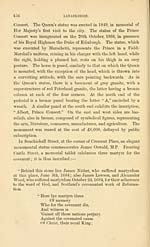Grampian Club > Monuments and monumental inscriptions in Scotland > Volume 1
(479) Page 455
Download files
Complete book:
Individual page:
Thumbnail gallery: Grid view | List view

PARISH OF GLASGOW. 455
Lord Gough in the Punjaiib campaigns of 1848-9 ; he distinguished
himself at the battle of Chillianwallah, where he was wounded,
and at Goojerat, when the Sikhs were crushed. In 1849 he was
created K.C.B. ; for his conduct at Goojerat he received the thanks
of Parliament. As Brigadier-General he commanded the Peshawur
district in 1851, and in the following year distinguished himself
in the expedition against the Octmankbail tribes. On the outbreak
of the Eussian War he, as Major-General, took command of the
Highland Eegiments. For his successful impetuosity at the battle
of the Alma, he won much fame, which was greatly enhanced by
his successful resistance of the Eussian cavalry on the field of
Balaclava. In 1856, he was promoted as Lieut.-General, received
the Grand Cross of the Bath, was created D.C.L. of Oxford, and
had conferred on him many Continental military honours. The
city of London admitted him to its freedom, and the citizens of
Glasgow voted him a sword value £300, and entertained him at
a public Banquet. When tidings of the Indian Mutiny reached
this country he was appointed to the chief command ; he requested
only twenty-four hours for preparation. He arrived at Calcutta
on the 29th August, and reached the Alumbagh early in November.
On the 3rd November he fought the battle of Cawnpore, and again
defeating the insurgents at Gwalior, effected the liberation of
the garrison of Lucknow, on the 17th of the same month. After
defeating the rebels at Futteghur on the 2nd January, 1858, he
reduced Lucknow early in the following March ; and suppressed
the insurrection. For these important services he received the
thanks of both Houses of Parliament, and was created a Baron by
the title of Lord Clyde, with a pension of £2,000. In 1860, he
was appointed Colonel of the Coldstream Guards, and was raised
to the military rank of Field-Marshal on the 9tli November, 1862.
After a short illness, he died at the Government House, Chatham,
on the 14th August, 1863. His remains were placed in West-
minster Abbey.
Near the centre of George Square two elegant equestrian statues
celebrate Her ]\Iajesty the Queen, and H.E.H. the late Prince
Lord Gough in the Punjaiib campaigns of 1848-9 ; he distinguished
himself at the battle of Chillianwallah, where he was wounded,
and at Goojerat, when the Sikhs were crushed. In 1849 he was
created K.C.B. ; for his conduct at Goojerat he received the thanks
of Parliament. As Brigadier-General he commanded the Peshawur
district in 1851, and in the following year distinguished himself
in the expedition against the Octmankbail tribes. On the outbreak
of the Eussian War he, as Major-General, took command of the
Highland Eegiments. For his successful impetuosity at the battle
of the Alma, he won much fame, which was greatly enhanced by
his successful resistance of the Eussian cavalry on the field of
Balaclava. In 1856, he was promoted as Lieut.-General, received
the Grand Cross of the Bath, was created D.C.L. of Oxford, and
had conferred on him many Continental military honours. The
city of London admitted him to its freedom, and the citizens of
Glasgow voted him a sword value £300, and entertained him at
a public Banquet. When tidings of the Indian Mutiny reached
this country he was appointed to the chief command ; he requested
only twenty-four hours for preparation. He arrived at Calcutta
on the 29th August, and reached the Alumbagh early in November.
On the 3rd November he fought the battle of Cawnpore, and again
defeating the insurgents at Gwalior, effected the liberation of
the garrison of Lucknow, on the 17th of the same month. After
defeating the rebels at Futteghur on the 2nd January, 1858, he
reduced Lucknow early in the following March ; and suppressed
the insurrection. For these important services he received the
thanks of both Houses of Parliament, and was created a Baron by
the title of Lord Clyde, with a pension of £2,000. In 1860, he
was appointed Colonel of the Coldstream Guards, and was raised
to the military rank of Field-Marshal on the 9tli November, 1862.
After a short illness, he died at the Government House, Chatham,
on the 14th August, 1863. His remains were placed in West-
minster Abbey.
Near the centre of George Square two elegant equestrian statues
celebrate Her ]\Iajesty the Queen, and H.E.H. the late Prince
Set display mode to: Large image | Transcription
Images and transcriptions on this page, including medium image downloads, may be used under the Creative Commons Attribution 4.0 International Licence unless otherwise stated. ![]()
| Publications by Scottish clubs > Grampian Club > Monuments and monumental inscriptions in Scotland > Volume 1 > (479) Page 455 |
|---|
| Permanent URL | https://digital.nls.uk/80696177 |
|---|
| Description | Vol. I. |
|---|---|
| Attribution and copyright: |
|
| Description | Note: Numbers 24-41 are relative to but not part of the Club's series. |
|---|---|

